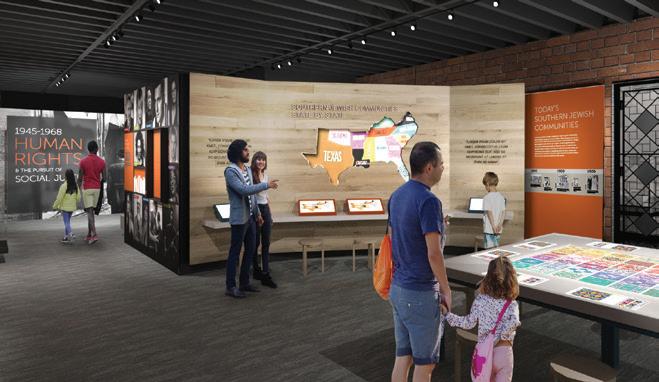
8 minute read
Ancient Crafts to Create Breakthrough Designs at the Dead Sea
Students in the Department of Industrial Design at Bezalel Academy in Jerusalem participate in a Bedouin style weaving course as part of at the annual Dead Sea Seminar, February 2020. Credit: Courtesy.
ANCIENT CRAFTS AT THE DEAD SEA
Advertisement
WORKSHOPS AT AN ANNUAL DESIGN SEMINAR CREATE BREAKTHROUGH DESIGNS BY EDEN ZUREK | JNS.ORG
The Dead Sea is a haven of relaxation for the many thousands of visitors who flock to the lowest place on Earth. Visitors love to take advantage of the natural spa treatments and float on the sea’s tranquil shades of water to recharge their batteries and heal.
One group of visitors, however, recently made their way down to the Dead Sea for a lot more than relaxation. Bezalel Academy of Arts and Design, Jerusalem’s Department of Industrial Design, held a three-day off-site seminar to spark creativity and opportunity in the minds of their students, inspiring them to produce innovative new designs.
The Dead Sea Seminar has taken place Students in the Department of Industrial Design at Bezalel Academy in Jerusalem utilize a hand-built wooden bicycle to scrape and shape natural materials at the annual Dead Sea Seminar, February 2020. Credit: Courtesy.

every December since 2004 and was the brainchild of then-chairman of the Department of Industrial Design, Professor Ami Drach. After his sudden death seven years ago, the department decided to honor their beloved mentor and keep his tradition alive by dedicating future seminars in his memory.
The seminar introduces different approaches to craft, including ancient, manual and computerized. Methods and techniques are presented by the department’s lecturers alongside guest designers from abroad in a variety of workshops, such as blacksmithing, sand-casting, Bedouin-style weaving, plastic rotation, wood-engraving and 3D printing with mud and coffee.
Students are encouraged to think outside the box.
Though the seminar is officially run by the Department of Industrial Design, it’s evident that the students are involved in every step of the process. They take part in all arrangements, workshops, kitchen duties and even financial expenses. The seminar isn’t created for them; rather, it is created by them. For example, last year, the students decided that they no longer wanted to use plastic cutlery as the ecological aspect is a focal part of the seminar. Therefore, this year, each person brought their own set of cutlery, plates and cups.
When the students are not spending their time working and creating, they are most likely to be found setting up their own tents, doing yoga and bonding around the bonfire. One of the main values highlighted throughout the seminar is teamwork.
“Each person comes from a different background and has their own unique set of skills to share,” said student Erez Eitan. “We all work together, combining ideas to create new and wonderful things.”
During the seminar, students are encouraged to open their minds and think outside the box.
“We are here to experiment and find new solutions,” said Rabea Gebler, an exchange student from Germany.
“This workshop is an opportunity to remember the simplicity and beauty of nature, and the world of art. This place allows us to put our worries aside and stop our daily routines, take a deep breath, and let our wild ideas run free,” said student Sharon Delevi. This year, for the first time, international guest lecturers participated in the seminar, working hand-in-hand with the students. This new initiative was mutually beneficial for both students and guests, who were exposed to new ideas and varied methodologies.
Having never visited the Dead Sea before, award-winning French product designer, Marlene Huissoud—one of the international guests invited to the seminar to help students push boundaries—said she found the opportunity to combine the beautiful natural surroundings with art extremely valuable.
“This location allows you to disconnect from all the limitations that are holding you back,” described Huissoud. “It is fantastic for the students to learn about all of these primitive techniques, which challenge their current ways of thinking and creating. We encourage them to search for alternatives, and since we live in such a materialistic age, we wanted to take the students back to the roots of crafting, start from zero and rethink
“In a world full of machines and high-tech, we sometimes forget the basics of using our hands and nature to create,” artist Omer Polak, product designer and graduate of Bezalel Academy said.
everything they know in order to create a better and more sustainable future.”
Huissoud was invited to the seminar by artist Omer Polak, product designer and graduate of Bezalel Academy. Polak, who lives in Berlin, agrees with Huissoud’s approach. The Dead Sea can be compared to a desert island.
“The seminar is amazing in its concept that it is low-tech and takes place in the lowest place in the world, allowing for the return of ancient crafts,” said Polak. “In a world full of machines and high-tech, we sometimes forget the basics of using our hands and nature to create. Things that are developed during these few days can serve the students throughout their entire careers.”
Ido Ferber, a Bezalel Academy graduate, who organized this year’s seminar, explained that “the industrial revolution almost completely obliterated the craft workers, thereby creating a gap in which the artisans disappeared. The purpose of this seminar is to bring it back to life, and make it relevant to this day and age.”
According to Sefi Hefetz, head of the Department of Industrial Design, “the seminar is somewhat of a ‘sandbox’ — a metaphor for a place where ideas are formed through working hands and raw materials.” The Dead Sea can be compared to a desert island in many ways, disconnected from the ordinary rhythm of life. Ironically, this disconnection from the rest of the world can create a deep connection between participants.
“There have been some great breakthroughs at this seminar, but the main value that this experience encourages is community — a human bonding between the students and everyone else,” said product designer Dov Ganchrow, one of Drach’s close friends and a senior lecturer at Bezalel Academy. “I come back every year, and the faces are usually very familiar. With most of us bringing spouses and children along, it’s become a wonderful reunion and family experience.”

JNF TO SHOWCASE WORK WITH DISABILITIES DURING WOMEN FOR ISRAEL TEA
Women are a powerful force in philanthropy and that power shapes our world. The impact of women in philanthropy continues to surge as more wealth becomes concentrated among women. It is estimated that by 2030, three-quarters of all wealth in the U.S. will be controlled by women. Today, 60 percent of wealth is already managed by women.
Studies also show that women are the major influencers of charitable giving in their households, and for the last decade, women’s giving has outpaced that of their male counterparts. At Jewish National Fund in particular, women philanthropists comprise 50,000 donors to Jewish National Fund’s annual campaign and bring in over $24 million in donations. That number represents individual women who make their own gifts through our Women for Israel campaign. The impact is even greater when we consider couples who give jointly. Women are philanthropic decision makers.
Jewish National Fund strives to engage young women through JNFuture, its community for young professionals ages 22–40, to teach about the impact philanthropy can make. It is our goal to nurture leaders who will go on to participate on Jewish National Fund Task Forces, Committees, and at the Board of Directors level. Women who make a generous contribution can become members of the Sapphire Society—one of the Major Donor societies for women—which now numbers over 835. The Chai Society, our donor society for women

beginning their philanthropic journey, now has over 500 members.
Our Women for Israel members have had, and continue to have, a unique opportunity to build the land of Israel for future generations. Remember, it was Jewish National Fund women who raised the dollars to build the town of Zuqim in the Arava, jumpstarting Jewish National Fund’s Blueprint Negev initiative back in 2000. We built a town in the desert, on a parcel of sand once laden with landmines from past wars! Today, 400 hundred people call Zuqim home. Women for Israel are not just givers—we are the doers.
And what are we doing in San Diego? In April, we are bringing a very special part of our vision to share with the community. For the 2020 Women for Israel Tea, Lt. Col. (Res.) Tiran Attia is joining Jewish National Fund from Israel to speak about his work as Director of Special in Uniform, an innovative program that integrates youth with disabilities into the Israel Defense Forces (IDF).
The Women for Israel Tea, which is being chaired by San Diego Women for Israel Chair and San Diego Board Member Debbie Kornberg, will feature a boutique sale with apparel, jewelry, self-care items, homeware, culinary tools, and more; 20% of proceeds will benefit Jewish National Fund’s work with Special in Uniform.
Join Jewish National Fund for this unforgettable and unique celebration of women and the tremendous work being done for the prosperity of the land and people of Israel. The Tea will take place on April 26, 2020 at Fairbanks Ranch Country Club. The boutique will open at 1:00 pm and the Tea will begin at 3:00 pm.
RSVP is required by April 21, 2020 via jnf.org/sdwfitea2020. Tickets are $36. This event is open to all women who make a minimum annual gift of $360 to Jewish National Fund. For questions and sponsorship opportunities, please contact Monica Edelman, San Diego Director, at medelman@jnf.org or 858.824.9178 x988.
Myra Chack Fleischer is national president of Jewish National Fund’s Women for Israel.










